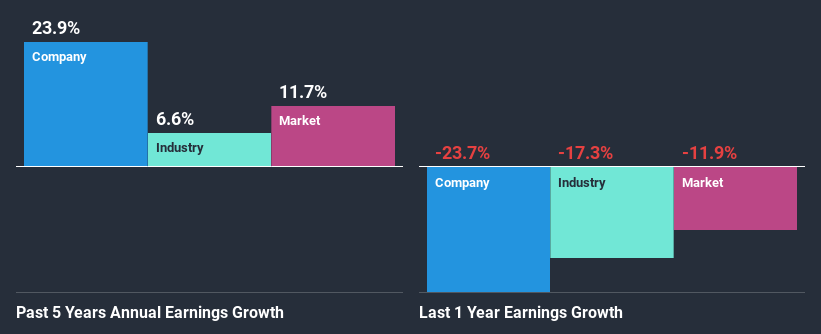Declining Stock and Solid Fundamentals: Is The Market Wrong About Sirius Real Estate Limited (LON:SRE)?

With its stock down 4.8% over the past three months, it is easy to disregard Sirius Real Estate (LON:SRE). But if you pay close attention, you might gather that its strong financials could mean that the stock could potentially see an increase in value in the long-term, given how markets usually reward companies with good financial health. Specifically, we decided to study Sirius Real Estate's ROE in this article.
ROE or return on equity is a useful tool to assess how effectively a company can generate returns on the investment it received from its shareholders. In simpler terms, it measures the profitability of a company in relation to shareholder's equity.
See our latest analysis for Sirius Real Estate
How Do You Calculate Return On Equity?
ROE can be calculated by using the formula:
Return on Equity = Net Profit (from continuing operations) ÷ Shareholders' Equity
So, based on the above formula, the ROE for Sirius Real Estate is:
12% = €98m ÷ €802m (Based on the trailing twelve months to March 2020).
The 'return' is the amount earned after tax over the last twelve months. That means that for every £1 worth of shareholders' equity, the company generated £0.12 in profit.
What Has ROE Got To Do With Earnings Growth?
Thus far, we have learned that ROE measures how efficiently a company is generating its profits. We now need to evaluate how much profit the company reinvests or "retains" for future growth which then gives us an idea about the growth potential of the company. Assuming all else is equal, companies that have both a higher return on equity and higher profit retention are usually the ones that have a higher growth rate when compared to companies that don't have the same features.
A Side By Side comparison of Sirius Real Estate's Earnings Growth And 12% ROE
At first glance, Sirius Real Estate seems to have a decent ROE. Further, the company's ROE compares quite favorably to the industry average of 7.4%. Probably as a result of this, Sirius Real Estate was able to see an impressive net income growth of 24% over the last five years. However, there could also be other causes behind this growth. For instance, the company has a low payout ratio or is being managed efficiently.
As a next step, we compared Sirius Real Estate's net income growth with the industry, and pleasingly, we found that the growth seen by the company is higher than the average industry growth of 6.6%.
Earnings growth is a huge factor in stock valuation. The investor should try to establish if the expected growth or decline in earnings, whichever the case may be, is priced in. Doing so will help them establish if the stock's future looks promising or ominous. If you're wondering about Sirius Real Estate's's valuation, check out this gauge of its price-to-earnings ratio, as compared to its industry.
Is Sirius Real Estate Efficiently Re-investing Its Profits?
Sirius Real Estate has a three-year median payout ratio of 32% (where it is retaining 68% of its income) which is not too low or not too high. By the looks of it, the dividend is well covered and Sirius Real Estate is reinvesting its profits efficiently as evidenced by its exceptional growth which we discussed above.
Moreover, Sirius Real Estate is determined to keep sharing its profits with shareholders which we infer from its long history of six years of paying a dividend. Looking at the current analyst consensus data, we can see that the company's future payout ratio is expected to rise to 57% over the next three years.
Conclusion
On the whole, we feel that Sirius Real Estate's performance has been quite good. Particularly, we like that the company is reinvesting heavily into its business, and at a high rate of return. Unsurprisingly, this has led to an impressive earnings growth. That being so, a study of the latest analyst forecasts show that the company is expected to see a slowdown in its future earnings growth. To know more about the company's future earnings growth forecasts take a look at this free report on analyst forecasts for the company to find out more.
This article by Simply Wall St is general in nature. It does not constitute a recommendation to buy or sell any stock, and does not take account of your objectives, or your financial situation. We aim to bring you long-term focused analysis driven by fundamental data. Note that our analysis may not factor in the latest price-sensitive company announcements or qualitative material. Simply Wall St has no position in any stocks mentioned.
Have feedback on this article? Concerned about the content? Get in touch with us directly. Alternatively, email editorial-team@simplywallst.com.

 Yahoo Finance
Yahoo Finance 
